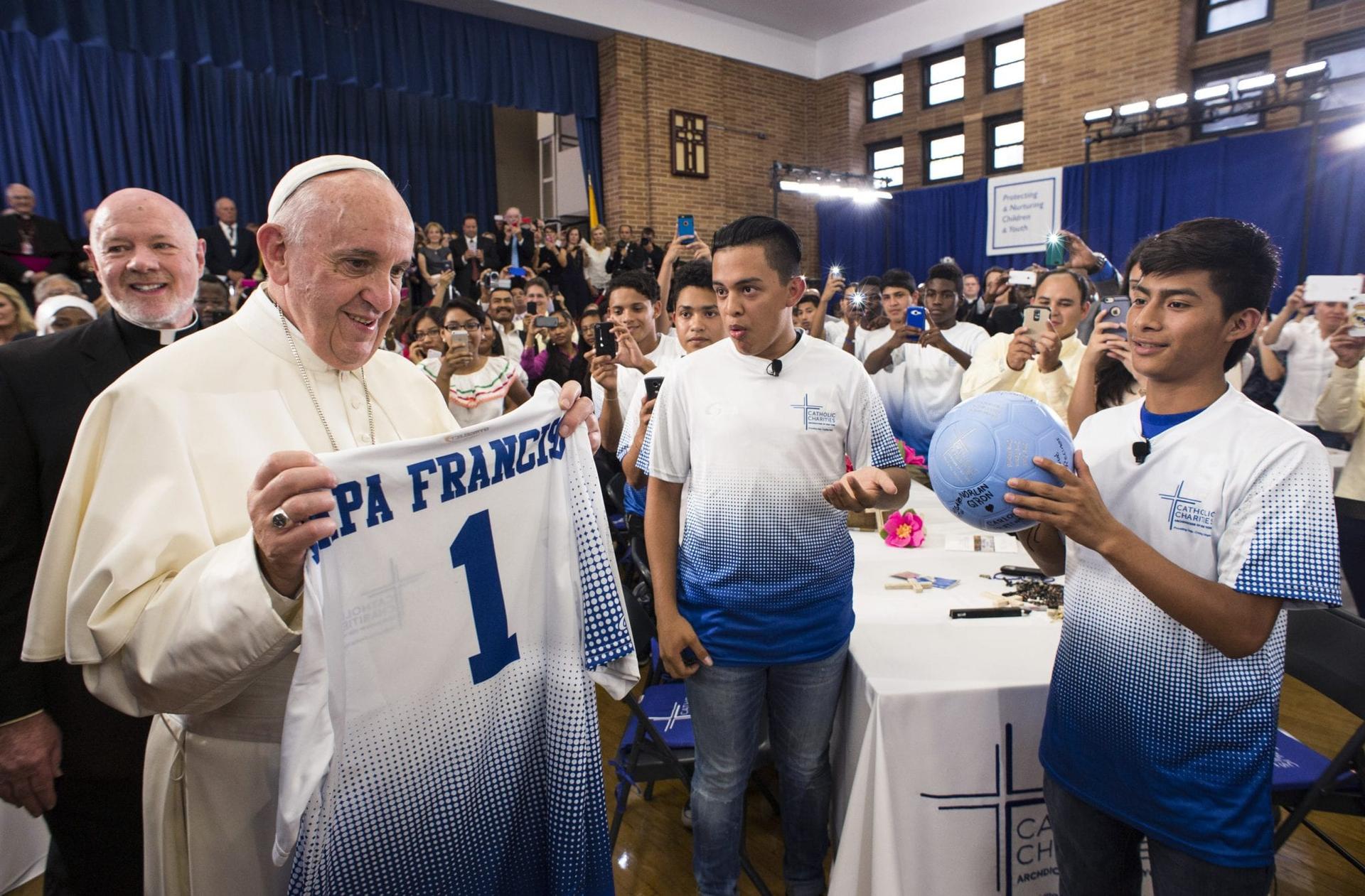ROME – Even though the Vatican is being tight-lipped regarding Pope Francis’s mode of following the World Cup unfolding in Russia this month, it’s hard to believe he woke up on Friday not knowing that his national team Argentina lost 3-0 to Croatia and is a step closer to elimination from the tournament.
“We can be pretty sure he knows what’s going on,” a senior Vatican official told Crux on Saturday about whether Francis is being kept up to date on the action.
The passion fueled by soccer in many countries of the world is comparable to that of the Super Bowl for Americans, sometimes even more: Last week, when Mexico scored the go-ahead goal against Germany, the celebration back home actually triggered earthquake alarms.
Despite not being one to watch the games himself- Francis once famously said that he’s never even seen Lionel Messi, arguably the world’s best soccer player right now, score a goal, because back in 1990 he made a promise to Our Lady not to watch TV – the pope is known to be an avid soccer fan.
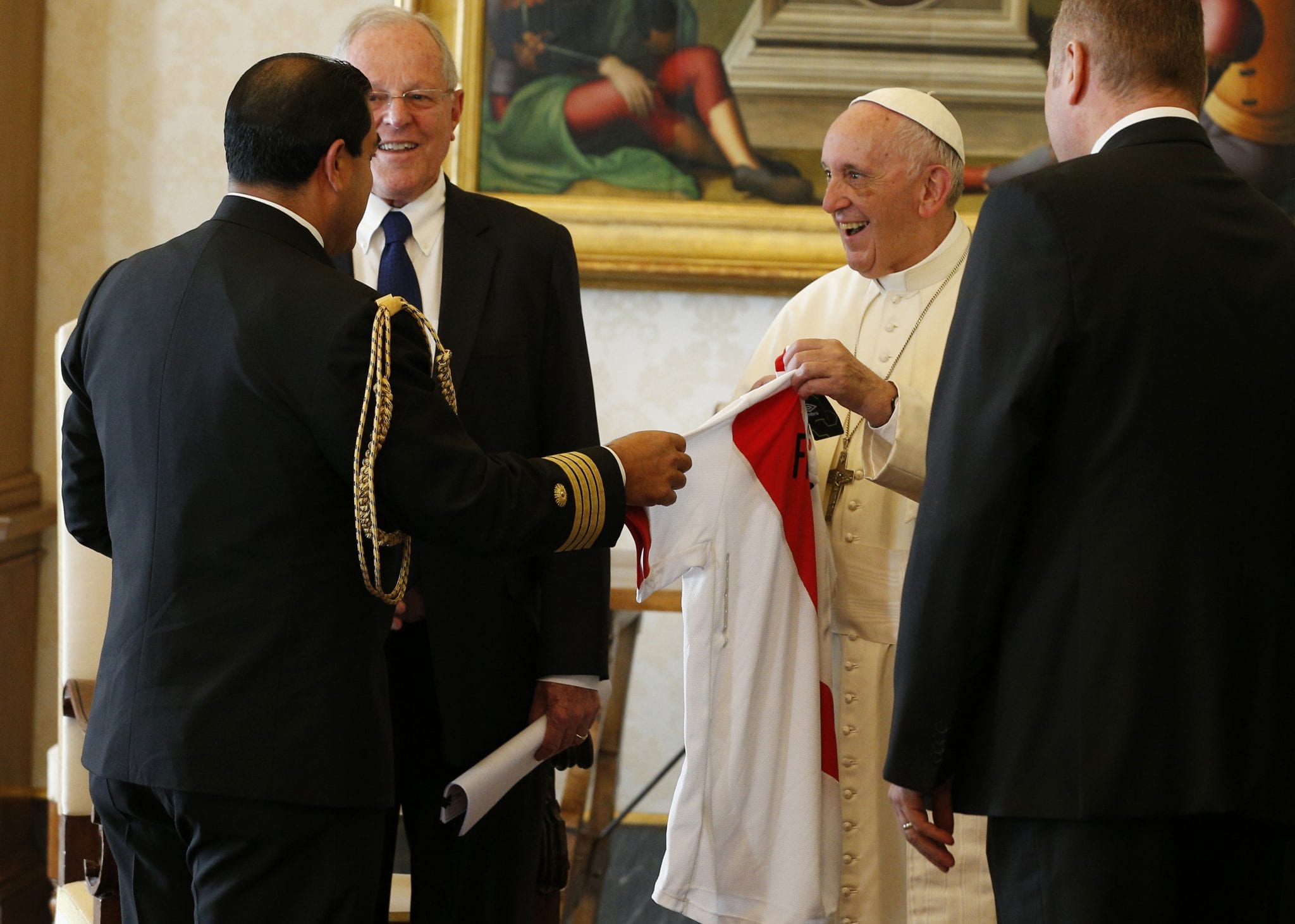
The last time the World Cup was played, back in 2014, in Rio de Janeiro, Brazil, the pope reportedly asked the Swiss Guard, his small personal army, to keep him updated on how Argentina was doing. Attempts to confirm that this was the case this year have yielded no response, with the guards insisting that the pope’s requests remain confidential.
Soccer and the New Evangelization
It’s well known among close observers that Francis loves the sport. Less known perhaps, is that when he was in Argentina, he saw soccer as an ice-breaker and yet another element of a Church that goes out to encounter the faithful where they are.
“It’s all part of the Church that goes out that he instilled: school, parish, soccer field,” said Federico Walls, press secretary of then-Cardinal Jorge Mario Bergoglio, when the pope was still the archbishop of Buenos Aires.
Soccer is ubiquitous in Argentina, where any street or sidewalk can serve as a field.
A big fan of San Lorenzo, the prelate would use his team as an excuse to “break the ice” in more than one situation, but never as he did during his annual August 7 visit to the Shrine of San Cajetan, in Liniers, a neighborhood on the edge of Buenos Aires.
Without fail after being appointed archbishop of Buenos Aires, Bergoglio would arrive early in the morning, spend hours hearing Confessions, say the main Mass at 11:00 a.m., and then spend three or four hours talking to those who were patiently waiting in a mile-long line to go in and pray to the saint known in Argentina as the patron of bread and labor.
“If he saw someone sporting the San Lorenzo jersey, he would celebrate, joke with them, say, ‘I see you’re smart people,’” Walls told Crux. “But if he found someone with the colors of Boca or River, he would always have a joke.”
Boca Juniors and River Plate are Argentina’s two major teams, and the pontiff was particularly good at making fun of those who followed the latter, nicknamed “chicken.”
The strategy of talking soccer also worked in more formal settings, to engage not only Catholics but as a bridge-builder with members of other religions.
“When he and Rabbi Abraham Skorka told me about their first meeting two decades ago, after a Te Deum, soccer was there,” said Marcelo Figueroa, an Argentinian Protestant theologian who Francis tapped to become the editor of the Argentinian version of L’Osservatore Romano, the Vatican’s newspaper, in 2016.
Apparently, San Lorenzo and River were playing each other that day, and when the archbishop went to greet the rabbi, in what’s often a protocol-filled handshake, Figueroa told Crux that Bergoglio bent the rules to quip: “I hear we’re eating chicken stew today?”
The two went on to become friends and co-wrote a book, On Heaven and Earth. The archbishop, the rabbi, and the Protestant leader had an inter-religious TV show too.
Anecdotes of Francis using soccer to break the ice abound, but friends say his love for soccer wasn’t a “pose” or something he spoke about in passing. To illustrate, Walls tells the story of once having shared a cab with the cardinal. The driver asked Bergoglio to bless his Bible, and as he was about to do it, urged the prelate to open it. Inside was a picture of a historic San Lorenzo team that won the national championship.
“I remember going to the stadium with my father, I saw that San Lorenzo [team] play,” Walls says the driver told Bergoglio, who responded saying that he too had seen the team play, and began naming all the players, including those on the bench.
It was a picture of the team of 1946, a year when Bergoglio never missed a game.
From the beginning of his pontificate, Francis has used soccer as a metaphor to make a point.
When he was in Brazil, participating in World Youth Day in Rio, because it was the place that would host the World Cup less than a year later, he said that Jesus promises something that is more important than the championship.
Some of his speeches from that trip were used by an Argentine sports channel for their World Cup ad:
During a weekly audience that same year, he said that reality, at times, is “dark and marked by evil,” but it can change if “we first bring the light of the Gospel especially through our lives.”
“If in a stadium — say the Olympic stadium in Rome or the San Lorenzo in Buenos Aires — on a dark night, someone turns on a light, you can barely see it, but if the other 70,000 spectators turn on their own light, the whole stadium shines. Let our lives together be the one light of Christ; together we will carry the light of the Gospel to the whole of reality.”
Young Jorge with “two left feet”
Though most Argentine boys at one point or another dream of being professional soccer players, young Jorge loved to play, but he wasn’t a good player, and he admits to that today.
In a 2015 interview with a homeless man who makes a living selling newspapers in Holland, Francis acknowledged that he would often sneak out of his home to play soccer with his classmates, and that he wasn’t a star athlete.
“In Buenos Aires, those who played soccer like me were called ‘pata dura,’ which means ‘having two left feet.’ I played; I was the goalie many times,” he said.
The pope’s former neighbors said back in 2013 that he once kicked the ball so hard that he broke a window. Instead of hiding, young Jorge knocked on the door of the house and confessed to having been the one to kick the ball.
But the pontiff wasn’t only a fan of playing. He loved going to the stadium with his father too. It was Mario Bergoglio who turned the future pope into a fan of San Lorenzo, a club founded by Father Lorenzo Mazza in 1908 to keep the children of his parish out of the streets.
Soon after his election to the pontificate, San Lorenzo de Almagro wasted no time in letting the world know that history’s first pope from the Global South was not just a casual fan, but a paying member of their fan club.
“It’s an honor for this club to know that the first South American pope is a member of San Lorenzo,” the club said on Twitter, illustrating the message with not only a photo of Francis years ago holding up a club flag but even his official membership card.
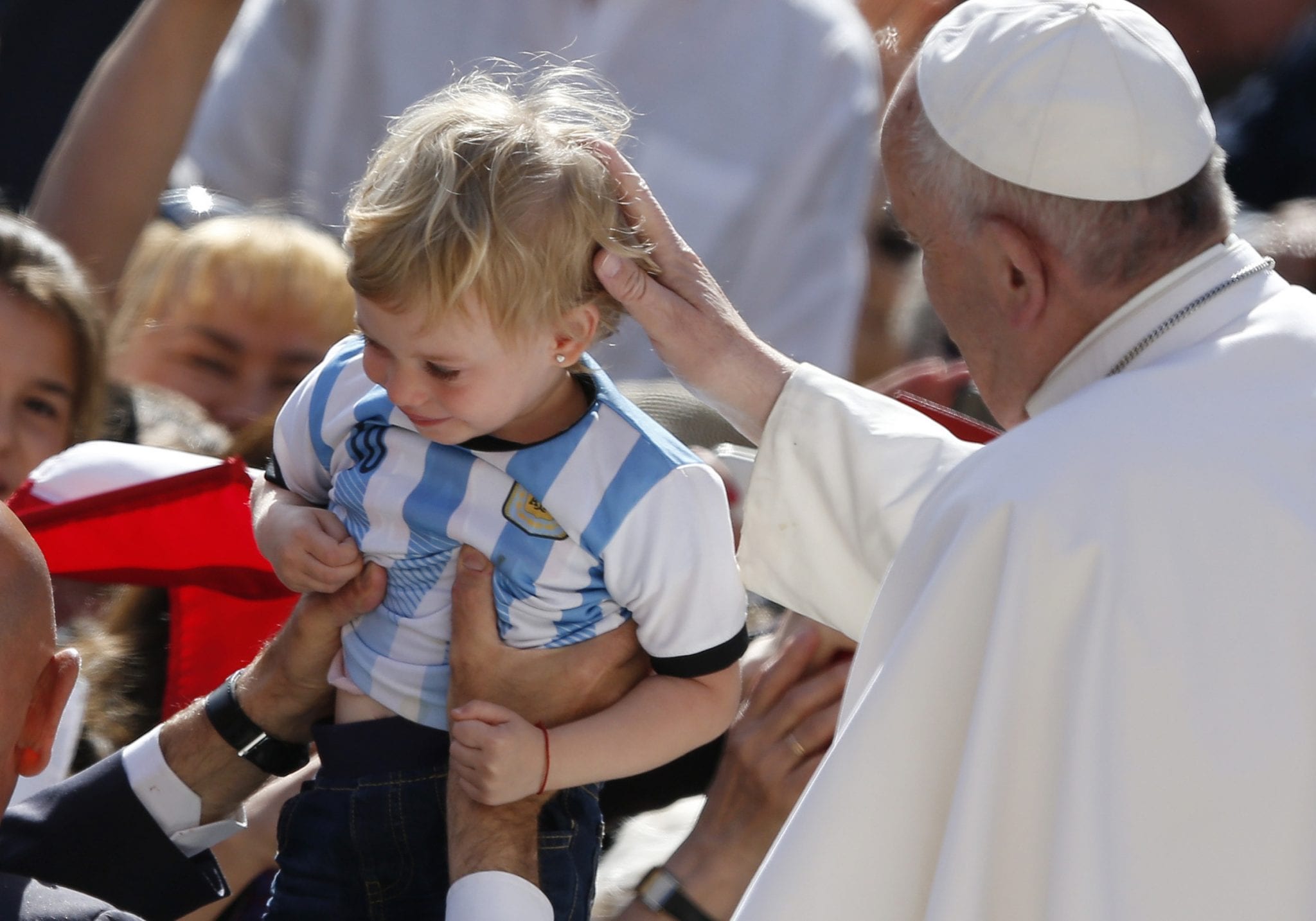
The pontiff has been incapable of hiding his love for San Lorenzo in the last five years. There’s footage from the Wednesday public audiences in which he’s signaling to a group of Argentine pilgrims the goals scored by his team.
When he was still in Buenos Aires, he had a piece of wood in his office that was taken from the bleachers of San Lorenzo’s old stadium.
In his third address after taking office, Francis even gave a shout-out from the Vatican balcony to club officials who had come to Rome to seek his blessing.
Soccer as a school of life
On August 13, 2013, Francis launched the global edition of Scholas Occurrentes, which has since become a papal foundation. The presentation took place in the Vatican, where the national teams of Argentina and Italy came together to play a friendly match. Messi and Gianluigi Buffon and many other great figures were in attendance.
The pontiff asked both teams that they pray for him, “So that I, on the field upon which God placed me, can play an honest and courageous game for the good of us all.”
He gracefully dodged the question of whether he’d offer a papal blessing for his home country’s team by saying: “It will really be a bit difficult for me to root, but luckily it’s a friendly match.”
But he also noted the influence athletes can have, especially on youth, and told the players to remember that, “for better or worse” they are role models. “Dear players, you are very popular. People follow you, and not just on the field but also off it,” he said. “That’s a social responsibility.”
According to Jose Maria del Corral, director of Scholas, many in the soccer environment questioned the pope’s decision to put that weight on the shoulders of the players. Yet, Del Corral said, for a teenager what they see in professional athletes can be more impactful than what their parents tell them or what they learn in school.
“He was setting the path for the renewal of the educational pact, since it has to involve society as a whole and the example sets the path more than what is said,” Del Corral told Crux.
“The pope always conceived of soccer as something more than a sport,” he said. “For the pope, it transcended a sport to become part of his experience of life. He’d go to the stadium with his parents, particularly his dad.”
This weekly tradition, Del Corral said, conveyed the love for Sunday as a celebration, and one to be shared as a family.
“When he says at a Scholas event that soccer is a school of life, he’s saying this as a pastor who lived this in his personal life,” he added.
The “Matches for Peace” have been organized several times already, with international players such as Messi, Brazilian soccer star Ronaldo de Assis and Francesco Totti participating at one point or another.
The foundation also has an agreement with the international soccer federation that is behind the World Cup (FIFA). Ahead of the world cup in Brazil, during the elimination stages, every match played by the Latin American national teams saw the athletes planting an “olive tree for peace.”
This relationship was the gateway for the pontiff to ask Gianni Infantino, the head of FIFA to address the fact that reportedly some 2,000 people working in slave-like conditions have died building the stadiums for Qatar 2022.
RELATED: Pope scolds FIFA for slave labor in Qatar
Del Corral also said that regardless of his personal love for soccer, Francis understands that the same idea of sports as a school of life can be applied to any other discipline, and Scholas is doing so.
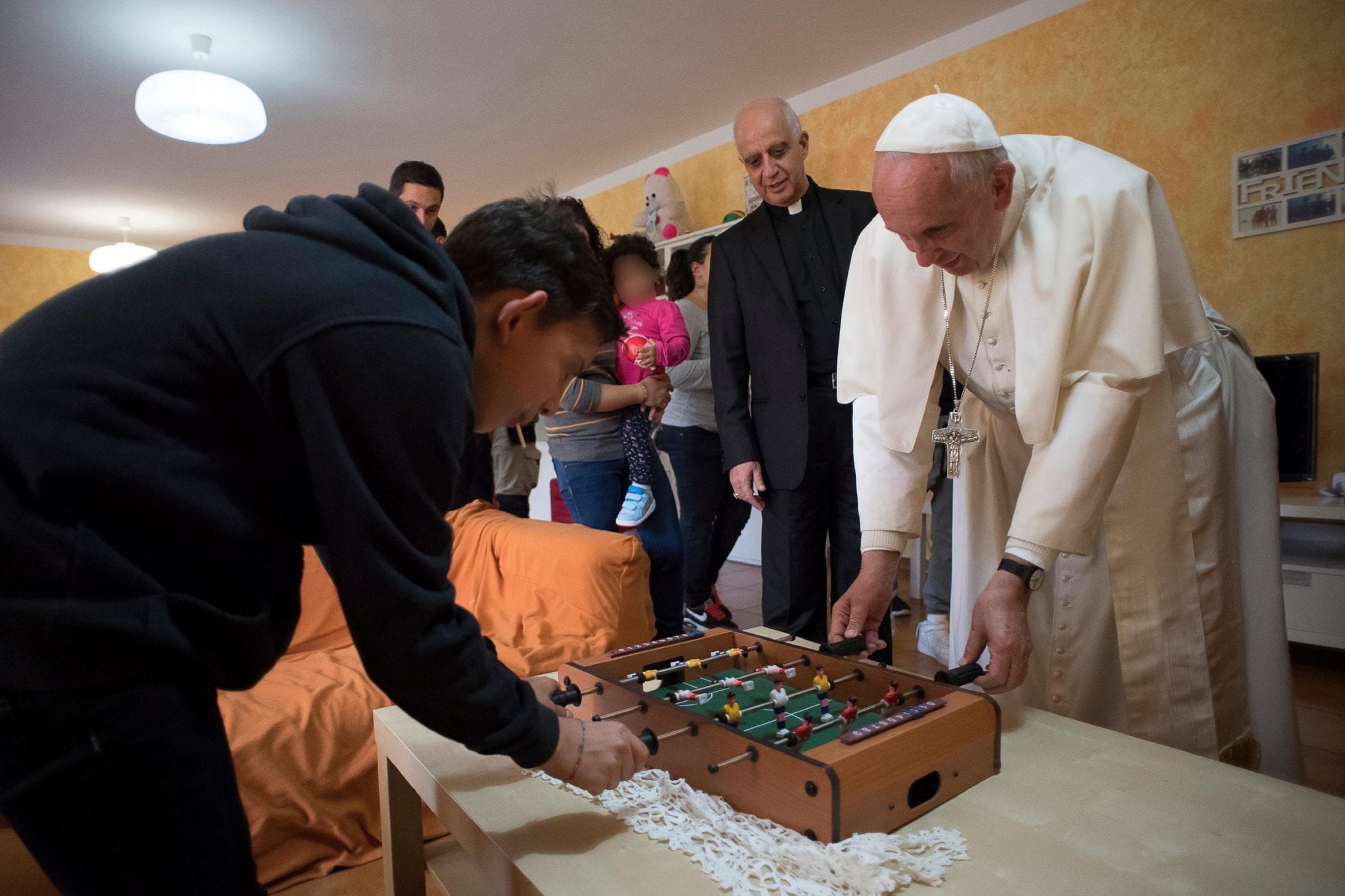
For instance, in Mozambique, they’ve opened a surfing school, where today 44 kids under the age of 12 learn to “overcome the abuses they’ve suffered through their entire lives by getting into the water and being in contact with nature.”
I’ll say a little pray for you?
Now, the pope is undoubtedly preoccupied by countless issues much more critical than a simple soccer tournament: from war in Syria and Iraq to the migrant crisis affecting virtually every continent.
However, if Argentinians want to help their team secure a pass to the next round, they would do well not only to pray for their team, but for the pope to do so too, as some credit him with a soccer-related “miracle” dating back to 2014.
Considered one of the “five big teams” of Argentina, San Lorenzo had won the national league many times, but never an international tournament before Francis became pope.
In Dec. 2013, 10 months after his election, San Lorenzo lifted the trophy of the national league. They celebrated their victory with a visit to the Vatican. Soon after, the San Lorenzo reached the final of the Copa Libertadores against National de Paraguay and would go on to raise their first trophy as champions of South America.
In February 2016, a fan of Boca Juniors, another of Argentina’s “big five,” asked the pope for a blessing so that Boca would beat San Lorenzo in the final of Argentina’s league that was to be played that night. The pontiff, laughing, said that he gladly “blessed the Ravens,” as the team is nicknamed.
“With the Bosteros (nickname for Boca Juniors), we have a not-so-bad relationship, it’s worse with the Chickens,” Francis said. His team would go on to win 4-0.
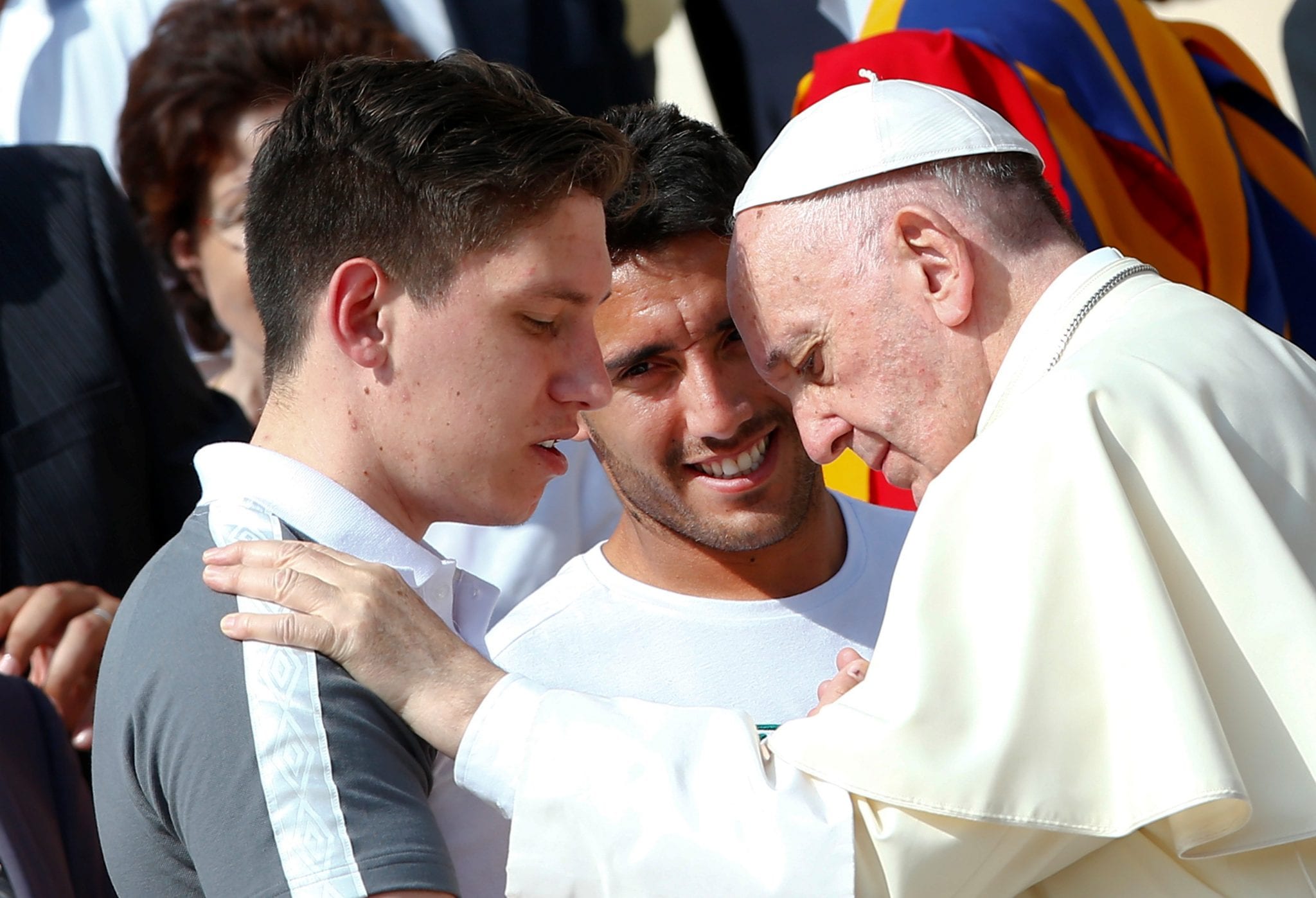
Some fervent believers still consider that the pope intervened through prayer (and others called for the Boca fan to be expelled from his team for apostasy), and millions in Argentina, after seeing the disappointing way in which the team lead by Messi has played so far, might want to see Francis do so again.
In fact, after the game, Twitter exploded with memes, many of which included asking the pope to write to “Dear [Jorge] Sampaoli,” the coach of Argentina, or at least to send him a rosary.
Though there’s no public evidence that he’s ever done so, there’s no evidence that he hasn’t either.
In 2014, before the previous World Cup – Argentina reached the finals and lost to Germany – the then-Brazilian President Dilma Rousseff visited the pontiff and presented him with an autographed jersey of the Brazilian national team and a soccer ball signed by star Ronaldo.
Joking, Francis said he had the feeling he was being asked to pray for Brazil, a long-time rival of Argentina. According to then-spokesman Father Federico Lombardi, Rousseff asked the pontiff to at least “be neutral,” with silence as her only response.
Del Corral said he couldn’t venture to say if Francis was praying for Argentina to win or not: “For him, what matters is not the result, but how the result was achieved. What is lived on the field is a reflection of what’s lived off of it, because one plays as one lives.”
Some 40 million Argentines hope that earlier this year, they were able to break the curse of the Madonna. Having the pope on their side, however, wouldn’t hurt either.
